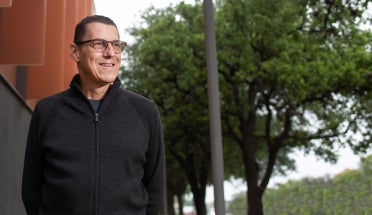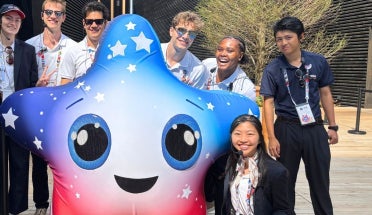Future Engineer: Studying Abroad Sets You Apart as a Job Applicant
- Oct 22, 2018
- Education Abroad
Just like NASA’s successful mission to the moon was a collaborative effort involving engineers from other countries, aerospace engineering student Anthony Carreon believes in the importance of expanding his worldview to set himself apart in an increasingly globalized job market. Carreon is a first-generation student born of immigrant parents, and his study abroad experience in Vienna, Austria, proves that study abroad is possible for anyone, thanks to the resources and opportunities available.
Carreon was a recipient of the Benjamin A. Gilman International Scholarship, a national scholarship funded by the U.S. Department of State. The grant program aims to make study abroad and international internships affordable to students with financial obstacles. The University of Texas at Austin is one of the Gilman top producing schools in the nation and is recognized for prioritizing accessibility and inclusivity of their international programs.
In this Q&A, Carreon shared with us experiences studying abroad from finding scholarships to navigating through challenges in a German-speaking country.
Anthony, why did you want to study abroad?
I wanted to study abroad because Dr. Moore, my professor for my first-year signature course, really encouraged us to do it. He mentioned that it is such an important part of a globalized world. If you want to be competitive, you are going to have to learn to interact with different people and adapt to different environments that you are not familiar with.
The other reason is that I had never been outside of the United States. It was actually my first time abroad. I wanted to get a grasp of the world’s different perspectives when it comes to education and the news – not from just the American perspective, but from other perspectives as well.
Why did you choose Vienna?
I did not have a particular place that I wanted to go to. I just wanted to be out of the country, I just wanted to experience that. I searched for a program that was related to my major. There was an engineering design in graphics course and it happened to be in Vienna. So, I ended up applying to that program.
Tell us more about your program.
I participated in a faculty-led Maymester program. It started in mid-May and ended in mid-June.
During the first two weeks, we had “emergency German” courses that lasted two hours. We learned the basics: how to ask where the restroom is located or how to ask someone if they spoke English. Then, we would get an hour or two of lectures with Dr. Thomas Krueger. After the seminar, we would come back and work on a project. Dr. Krueger would help us out and then we would have a homework assignment.
The good thing was that the coursework was just right. We weren't always studying. We would have time to go out and explore Vienna, all the beautiful palaces and gardens.
Because it was a faculty-led Maymester program, it felt like being at UT with my colleagues – who are now my friends – and my professor. It felt like being at UT except that I was in another country, so the atmosphere was different.
What was your favorite part of living in Vienna?
My favorite parts of living in Vienna were how close everything was. Everything was walking distance, which is something uncommon in the United States but I got accustomed to that life. They also drink water straight out of the faucet because water comes from and is filtered through the mountains. Also, public transportation is incredible; it is one of the best public transportation systems that I have used.
There are things that I got used to and things that American cities can learn from. Especially from an engineering perspective, taking things from Vienna and other places like Vienna on how efficient they run their entire water filter system and their transportation system.
How do you think first-generation college students view study abroad?
I'd definitely say first-generation college students don't have that many experiences with higher education. Their parents did not have that experience. It is definitely more intimidating. But, I'm pretty sure the majority of them think that it is possible. Finances just make it difficult, because it is expensive: the plane ticket, the fees and the food that you are going to buy.
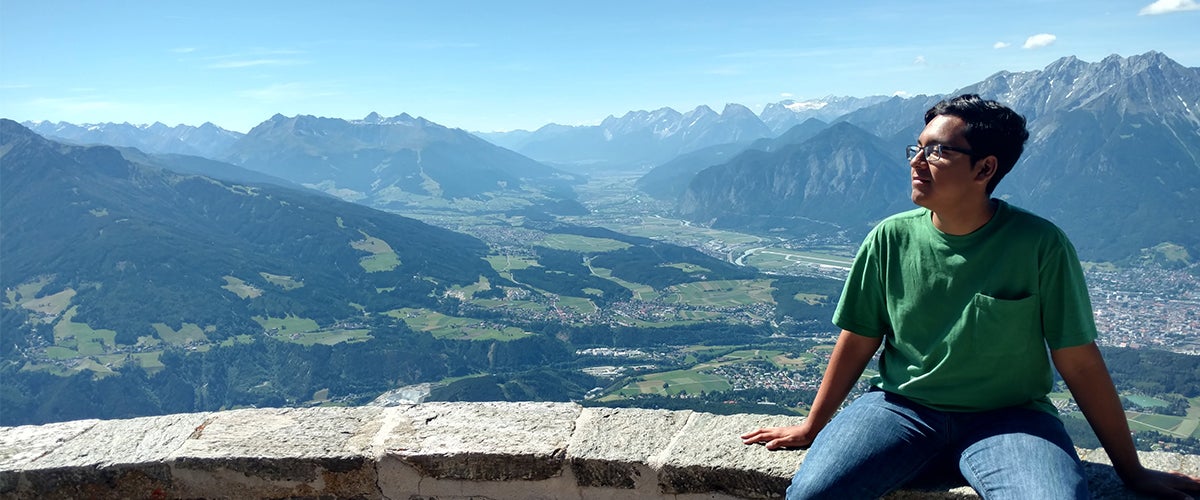
However, if students just became more informed about all the financial resources, all the scholarships, all the grants they could receive, they would be more inclined and less intimidated to go abroad.
Through my experience, I think UT does a great job advertising all the resources available to students so they can finance their study abroad. Had I not found out through advertising, I am not sure where I would have found the scholarships.
Tell us about the scholarships that you received.
I came across two scholarships with the help of Global Assist. One of them was the Maymester Engineering Scholarship funded by the Cockrell School of Engineering and I also found the Gilman Scholarship. If I had not gotten those scholarships, I don’t think I would have been able to study abroad. I am thankful for receiving those.
Were you scared about leaving the country?
I was very scared. One, I rarely go to airports and I’m unfamiliar with the airport process. But thanks to this experience, I went through several airports, several security checks, and now it is a kind of routine.
Also, when I landed in Vienna, everyone was speaking German, so that was very intimidating because I did not know what everyone was saying. I was unfamiliar with the environment in general. But now that I have gone through that experience, I feel more confident in traveling and doing things that involve complicated processes. I am thankful for this experience because it has really built my confidence.
Did your study abroad experience change you?
I believe I am a more confident person after being in such an unfamiliar environment and getting accustomed to that. I would also say that I now see things in a global lens.
For example, I was lucky to meet some German students in Vienna, and they had a different perspective on World War II history. It made me realize that people have so many different perspectives, and it opened my mind. Now, when I listen to the news and other sources of information, I think of them more critically. I see the things that are happening around the world, and I am thankful for being in a place with so many opportunities.
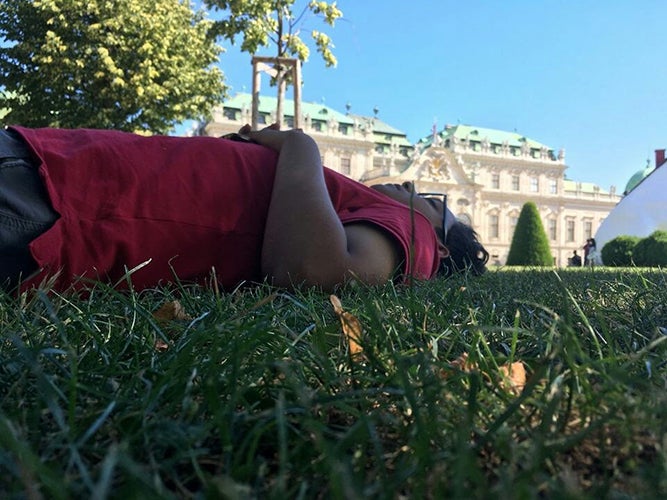
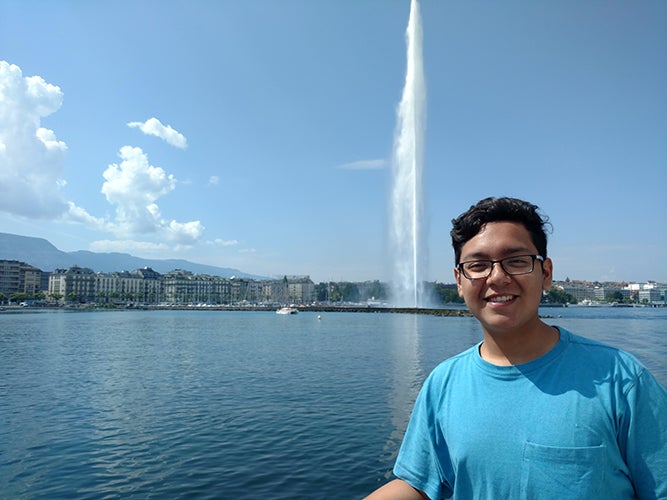
What are the skills you learned abroad that will set you apart when applying for jobs?
Some of the skills that I developed while studying abroad were adapting quickly and being flexible with being in a new culture. In Vienna, things move really fast just like they move here. You have to adapt quickly to the new environment. This is definitely going to help me when I move to, say, another country or when I move for a job, being able to snap into another culture in a new workplace. I definitely think that studying abroad gave me the skills necessary to compete in a globalized economy.
Do you think that engineering students need to study abroad to be more competitive?
Definitely. Students need to just go out somewhere to another country because we live in an age that is very globalized. For example, NASA doesn't just hire engineers from the United States, they are not just looking at the United States. They are looking everywhere, globally. They are looking for engineers with talent in a variety of places. NASA would not have gone to the moon if it wasn't for engineers from Germany. We had a lot of famous German engineers come to America and help us get to the moon.
Companies are expanding, and we need to adapt to compete with people from all over the world, and that is why international education is so important. Companies are now looking for workers all over the world. We, as engineers, need to learn how to compete globally.
Why is studying abroad important for you, personally?
My parents are immigrants, and the reason why they brought me here is that they wanted me to have a better chance at succeeding in life. Because I have that opportunity, I am taking advantage of it and I am making sure that I can reach my fullest potential. This is something that my parents would want.
This is why studying abroad is so important to me. I need to be able to compete in a globalized world. I need to gain those experiences, and I did it because I knew I could do it. The opportunity was right there for me so I had to go after it.
Are you planning on studying abroad again?
One of the things about studying abroad is that once you go, you want to return. I talk about this with my other study abroad friends all the time. We want to return.
The next natural step would be to do an internship abroad. I plan on applying for the Rise Internship next summer, it’s an internship program in Germany. I think that having an internship abroad is also important because it builds on top of the skills that you learned while studying abroad. In this case, you are actually learning how to be in a workplace environment in a different country, so you get the first-hand experience in interacting with different cultures.
Has studying abroad impacted your career ambitions?
Studying abroad has helped me look beyond the United States when it comes to career opportunities. I'm looking at places all over the world, and I think studying abroad has opened a lot of opportunities for me to work in whatever place I want to work in.
I think that the international education I received has set me apart because now I am able to look at things in a more globalized context, through a more global lens.
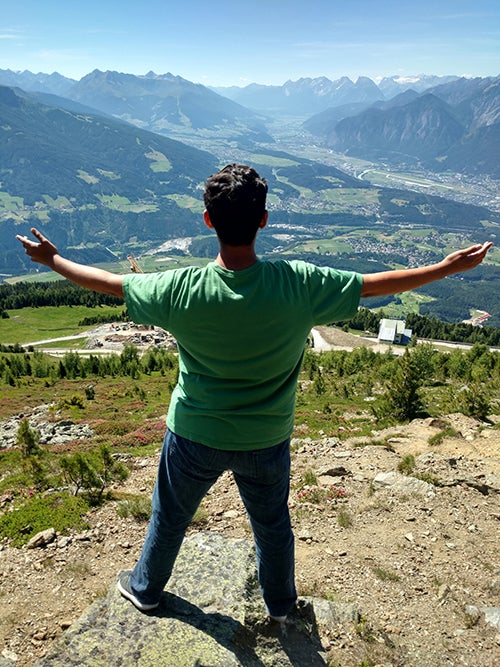

Learn more about the Gilman Scholarship, faculty-led programs and additional study abroad opportunities through the Cockrell School of Engineering.

